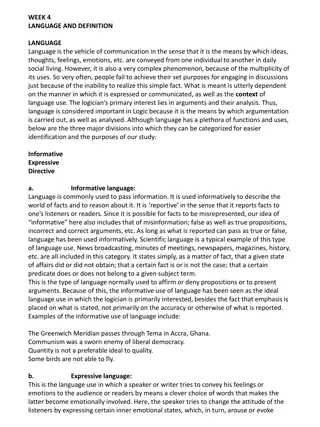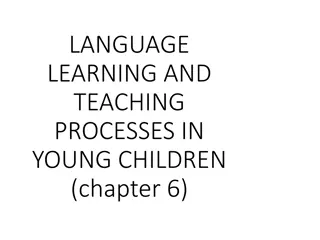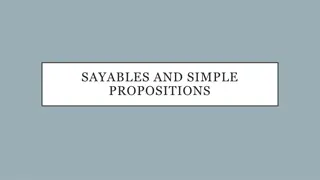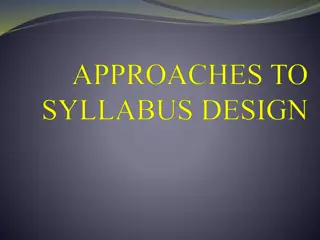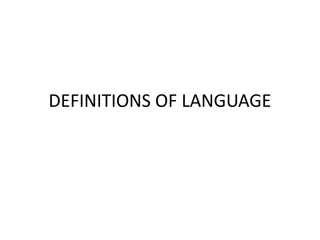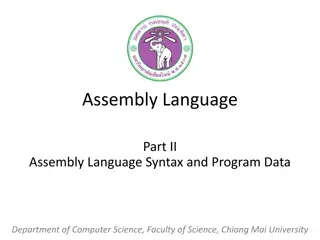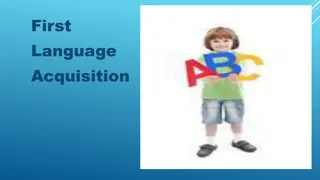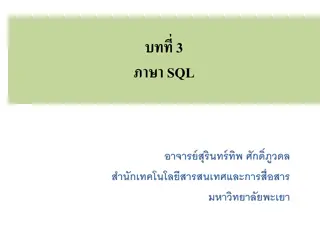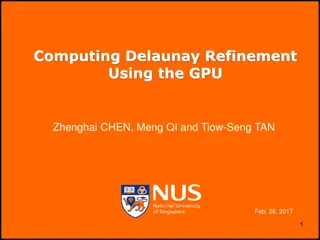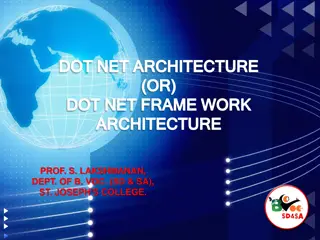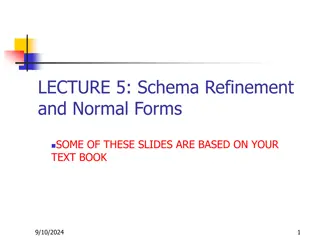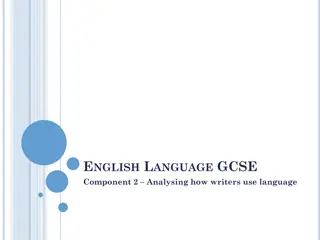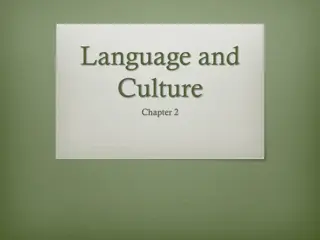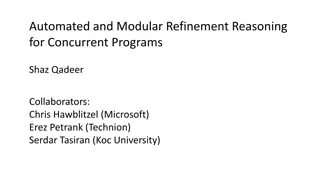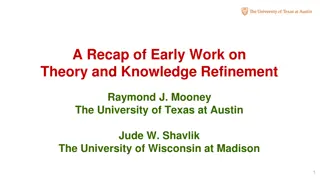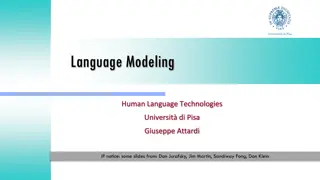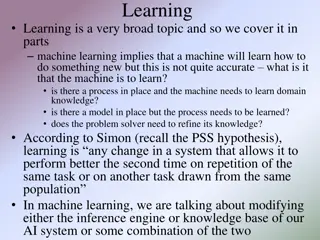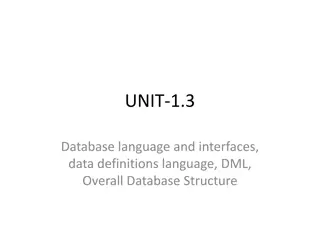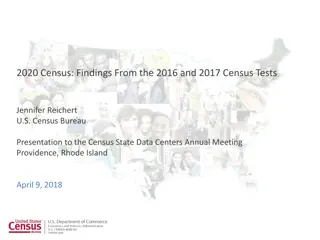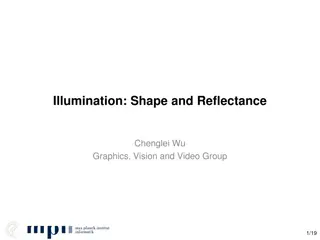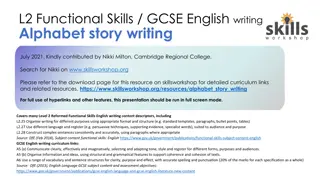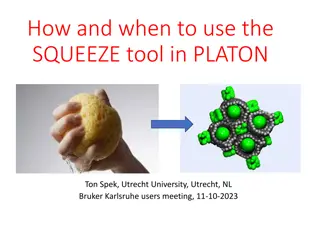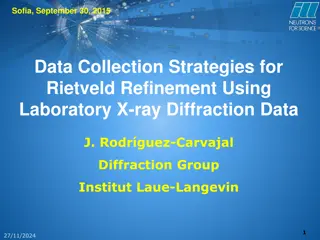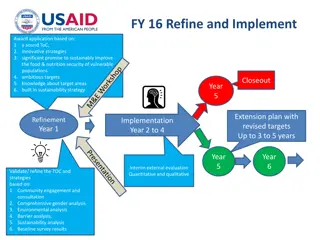Career Opportunities and Challenges in Translation & Interpreting Pedagogy Post-Pandemic
The APTIS 2022 conference explores new avenues in Translation and Interpreting (T&I) pedagogy amidst a changing landscape. Dr. Bego A. Rodriguez highlights emerging roles for T&I graduates. The context reveals a decline in language learning in the UK, impacting the Language Service Industry. The UK'
0 views • 13 slides
Language Study Community – Enhance Your Language Skills
Joining a Language Study Group is a fantastic way to take your language learning to the next level. By leveraging the power of Group Study, you can immerse yourself in the language, enhance your understanding, and build confidence in your speaking abilities. Read full article \/\/explainlearning.com
1 views • 3 slides
Academic Language Demands and Supports in Instructional Planning
Academic Language Demands and Supports are crucial in educational settings to ensure comprehension and usage of language by students. This content discusses embedding language demands in lesson plans, providing language supports, and peer review activities to enhance academic language skills. The fo
6 views • 10 slides
The Significance of Media in Language Learning
Media plays a crucial role in language learning by raising awareness of the ideology behind linguistic structures and providing valuable information on society and culture. Linguists are drawn to media language for research purposes and to understand its impact on language use and attitudes. Media s
12 views • 5 slides
Understanding Translation: Key Concepts and Definitions
Translation involves transferring written text from one language to another, while interpreting deals with oral communication. Etymologically, the term "translation" comes from Latin meaning "to carry over." It is a process of replacing an original text with another in a different language. Translat
12 views • 76 slides
Language and Communication in Society: Understanding Interactions
Explore the intricate relationship between language and society through lectures focusing on language in interaction, power dynamics, language contact and change, public space discourse, linguistic landscaping, and more. Delve into the shift from structural linguistics to societal communication, red
6 views • 28 slides
Understanding Language: Informative, Expressive, and Directive Uses
Language serves as a vital medium for communication, allowing the conveyance of ideas, thoughts, and emotions. It is a complex phenomenon with diverse uses. This text delves into the three major divisions of language use - informative, expressive, and directive. Informative language conveys facts, w
4 views • 6 slides
Language Learning and Teaching Processes in Young Children
Development of language in young children is influenced by various factors such as their cultural and linguistic environment, unique characteristics, and interactions with adults. Optimal language development requires language stimulation from the environment. Varied cultural practices impact langua
1 views • 51 slides
Understanding Language in Stoicism: Significance and Corporeality
Language in Stoicism plays a crucial role in the process of assenting to impressions by focusing on corporeality, reason, and truth. It distinguishes between the mundane vocal sounds, articulated speech, and significant language to convey meanings effectively. The significance of language lies not i
2 views • 13 slides
Understanding Language Teaching Syllabus: Integration, Theory, and Approaches
Language Teaching Syllabus involves the integration of subject matter and linguistic elements, guided by theories of language and learning. Various approaches like Grammatical, Situational, Communicative, and Analytic are used to structure syllabi. Breaking language into parts aids in sequential lea
1 views • 28 slides
Exploring Language and Communication Through a Short Film
In this lesson, students will watch a 10-minute short film titled "The Most Beautiful Thing" by Cameron Covell. They will reflect on the value of learning another language, analyze how facial expressions and body language convey emotions, and develop empathy towards those facing language barriers or
0 views • 29 slides
Various Definitions of Language Throughout Linguistic History
Different linguists and scholars have offered various definitions of language over time. Sapir (1921) emphasized language as a method of communicating ideas, emotions, and desires through voluntary symbols. Bloch and Trager (1942) focused on the social aspect of language as a system of vocal symbols
1 views • 12 slides
Introduction to Assembly Language Syntax and Program Data
Learn about the syntax of assembly language and how data, variables, and constants are used in programming. Explore the basic instructions and the translation of high-level language into assembly language. Discover the role of an assembler in translating assembly language programs into machine langu
4 views • 36 slides
Chemfos 700/710 Vxx Zinc Phosphate with Versa Bond Rinse Conditioner
Chemfos 700/710 Vxx Zinc Phosphate with Versa Bond Rinse Conditioner is a zinc phosphate-based surface conditioning material used in the water rinse before the zinc phosphate stage. It acts as a nucleating agent for superior crystal refinement, offering benefits like sludge reduction, compatibility
0 views • 4 slides
Enhancing Language Learning Across the Curriculum in B.Ed. 1st Year Course
Language Across the Curriculum (LAC) emphasizes that language learning should occur across all subjects, not just in language classrooms. It highlights the importance of incorporating language development into every learning activity, fostering multilingualism in schools. Language plays a crucial ro
2 views • 34 slides
Understanding First Language Acquisition Process
First language acquisition is the process through which humans develop the capacity to perceive, comprehend, and effectively use language to communicate. It primarily focuses on infants acquiring their native language. Basic requirements, caregiver speech features, and the acquisition schedule play
1 views • 19 slides
Comprehensive Overview of SQL Commands and Language Categories
In this detailed guide, you will learn about Structured Query Language (SQL) including its various commands such as Data Definition Language (DDL), Data Manipulation Language (DML), Data Control Language (DCL), and Transaction Control Language (TCL). Explore how SQL is used in Database Management Sy
0 views • 15 slides
GPU-Accelerated Delaunay Refinement: Efficient Triangulation Algorithm
This study presents a novel approach for computing Delaunay refinement using GPU acceleration. The algorithm aims to generate a constrained Delaunay triangulation from a planar straight line graph efficiently, with improvements in termination handling and Steiner point management. By leveraging GPU
0 views • 23 slides
Speech and Language Developmental Milestones: A Bilingual/Multilingual Perspective
Speech and language developmental milestones are crucial for children, regardless of their home language. These milestones encompass receptive language, expressive language, pragmatics, and articulation and phonology. Understanding how a child hears and talks from birth to one year is essential, as
1 views • 23 slides
Understanding .NET Framework Architecture and Common Language Runtime
This content delves into the intricacies of .NET architecture, highlighting its structure, common language runtime, and key components such as Common Type System (CTS) and Common Language System (CLS). It explains how .NET supports multiple languages, facilitates cross-language interoperability, and
0 views • 13 slides
Exploring C Program Refinement Types with Liquid Types and Invariant Discovery
Discover the integration of Liquid Types and Refinement Types in C programming through Invariant Discovery, leading to automatically adapting C programs to fit Liquid Types. Explore challenges and solutions in expressing invariants, handling unknown aliasing, and implementing strong updates within t
0 views • 24 slides
Database Schema Refinement and Normal Forms Explained
Explore the concept of schema refinement and normal forms in database management. Understand issues like insertion, deletion, and update anomalies in database tables. Learn about set-valued attributes and their implications in designing databases for tracking customer transactions.
2 views • 69 slides
Analyzing Writer's Language Use in English Language GCSE Component 2
In English Language GCSE Component 2, students learn to analyze how writers use language. The learning objective focuses on commenting, explaining, and analyzing language use with relevant subject terminology. The exam assesses students on their ability to interpret and explain a writer's thoughts,
0 views • 12 slides
Language and Culture Reflections: Diversity in Linguistic Emphasis
Exploring the correlation between language and culture, this content delves into how various languages reflect cultural values and priorities. Through examples like the Inuit language with rich vocabulary for snow and seals, the Shinzwani culture's unique word for mother and aunt, and the evolving l
0 views • 50 slides
Automated and Modular Refinement Reasoning for Concurrent Programs
This research explores automated modular refinement reasoning for concurrent programs, focusing on safety and correctness in operating systems and applications. Projects like Verve and Ironclad aim to achieve end-to-end security through formal verification tools and small trusted computing bases. Th
1 views • 12 slides
Evolution of English Vocabulary during the Renaissance
The English Renaissance era saw a significant influx of Latin and Greek words into the English language, enriching its vocabulary. Classical works were translated, introducing new terms like genius, specimen, criteria, and more. This era also saw the introduction of Greek-based suffixes like -ize an
0 views • 19 slides
Evolution of Theory and Knowledge Refinement in Machine Learning
Early work in the 1990s focused on combining machine learning and knowledge engineering to refine theories and enhance learning from limited data. Techniques included using human-engineered knowledge in rule bases, symbolic theory refinement, and probabilistic methods. Various rule refinement method
0 views • 12 slides
Understanding Language Modeling in Human Language Technologies
Exploring the concepts of language modeling in human language technologies, this presentation delves into N-grams, the chain rule of probability, evaluation metrics like perplexity, smoothing techniques such as Laplace, and the goal of assigning probabilities to sentences. It covers applications lik
2 views • 81 slides
Introduction to Language Technologies at Jožef Stefan International Postgraduate School
This module on Knowledge Technologies at Jožef Stefan International Postgraduate School explores various aspects of Language Technologies, including Computational Linguistics, Natural Language Processing, and Human Language Technologies. The course covers computer processing of natural language, ap
0 views • 27 slides
Exploring Sociolinguistics: Language Variation and Social Factors
Sociolinguistics delves into the study of language variation influenced by social factors, examining the relationship between language and its social context. It explores various aspects like standard pronunciation, language choice, speech acts, language components, language variety, and factors suc
0 views • 73 slides
Understanding Machine Learning: Types and Approaches
Machine learning involves various types of learning strategies, ranging from skill refinement to knowledge acquisition. This spectrum includes caching, chunking, refinement, and knowledge acquisition. Differentiating between supervised and unsupervised learning, understanding how machines learn is p
0 views • 45 slides
Understanding Assembly Language Programming for Computing Layers
Assembly language is a low-level programming language that enables direct interaction with a computer's hardware components. This content explores the fundamentals of assembly language, the relationship between human-readable machine language and binary code, an assembly language program for multipl
0 views • 31 slides
Database Language and Interfaces Overview
A database management system (DBMS) requires appropriate languages and interfaces to handle queries and updates for data manipulation and control. This includes Data Definition Language (DDL), Data Manipulation Language (DML), Data Control Language (DCL), and Transaction Control Language (TCL). Each
1 views • 12 slides
Understanding Language Anxiety in Foreign Language Learning and Teaching
Explore the impact of language anxiety on students and teachers in foreign language learning and teaching contexts through insights from Dr. Christina Gkonou's research. Delve into the theoretical background, implications for language education, and real-life experiences shared at the Essex Language
0 views • 25 slides
Insights from 2016 Census Tests by U.S. Census Bureau
The U.S. Census Bureau conducted tests in 2016 to refine technologies and methods for self-response and nonresponse follow-up operations. The tests aimed to enhance outreach efforts to historically hard-to-count populations, utilize non-Roman languages, and improve interview procedures for multi-uni
0 views • 25 slides
Advanced Techniques in Shape and Illumination Analysis
Exploring cutting-edge methods such as shape recovery from varying illumination and viewpoint, dynamic shape refinement from multi-view video, and depth estimation through photometric stereo constraints. The process involves factorization, compute depth maps, normal field calculations, and final sur
0 views • 13 slides
Alphabet Story Challenge: Dive into Creative Writing with Adverbs
Engage in a unique writing exercise by crafting a story of 26 sentences where each starts with a consecutive letter of the alphabet. Explore the use of adverbs while incorporating specific elements like dialogue, language techniques, and various sentence structures. Enhance your storytelling skills
0 views • 6 slides
Understanding the SQUEEZE Tool in PLATON for Solvent Refinement
The SQUEEZE tool in PLATON, developed by Utrecht University, offers an effective method for handling disordered solvent refinement in crystallography. This tool, part of the SHELXL suite, aids in modeling and refining solvent parameters when traditional methods may not suffice. Learn about its histo
0 views • 23 slides
Strategies for Rietveld Refinement Using X-ray Diffraction Data
Collection strategies for Rietveld refinement with laboratory X-ray diffraction data involve optimizing conditions for accurate peak intensities. Challenges such as poor particle statistics due to grain size, irradiated volume, or X-ray beam focus must be addressed. Powder diffraction plays a crucia
0 views • 26 slides
Sustainable Food & Nutrition Security Program Refinement for Vulnerable Populations
Developing and implementing an innovative program to improve food and nutrition security for vulnerable populations, with a focus on sustainability and ambitious targets. The refinement process includes community engagement, gender analysis, environmental assessment, barrier analysis, sustainability
0 views • 9 slides






